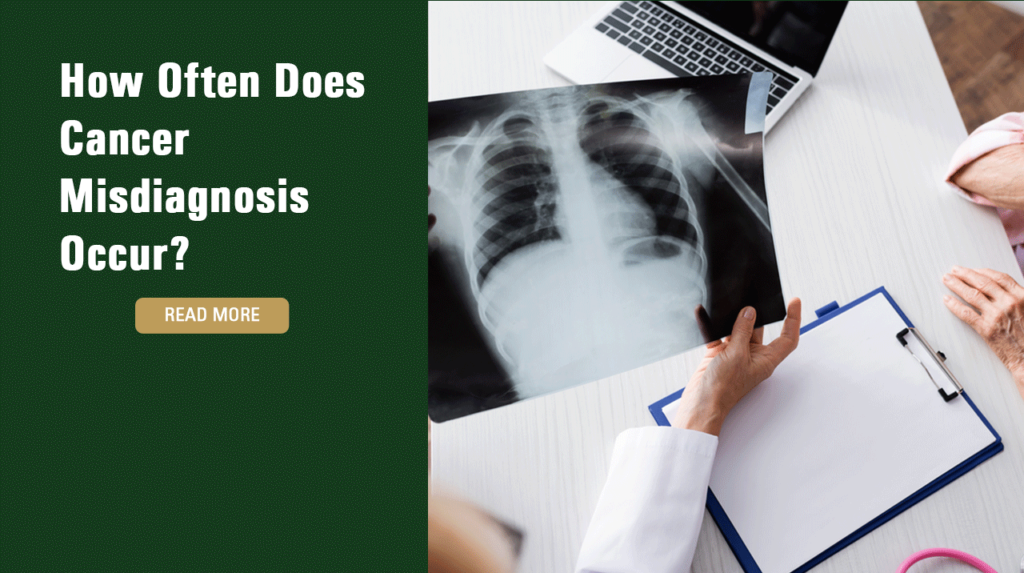How Often Does Cancer Misdiagnosis Occur?

Each year, millions of Americans are diagnosed with cancer. Some people also undergo cancer misdiagnoses. Unfortunately, cancer cases are expected to continue increasing to reach an estimated 29.5 million cases of cancer worldwide by 2040. Some people who have cancer have delayed diagnoses. When doctors fail to diagnose cancer early, their failure can have a devastating impact on patients who receive late diagnoses. Cancer that is not correctly diagnosed in its early stage can rapidly worsen and metastasize, greatly reducing the patient’s ability to beat the disease. If you were the victim of a delayed cancer diagnosis or another type of cancer misdiagnosis, you might be entitled to pursue compensation for your injuries and losses. Here is some information you should know about misdiagnosed cancer from the malpractice lawyers at Raynes & Lawn.
What Is Cancer Misdiagnosis?
Cancer misdiagnosis involves a doctor incorrectly diagnosing a patient with cancer when the patient doesn’t have it or failing to diagnose a patient with cancer when he or she has it. Both of these types of diagnostic errors can have a devastating impact on patients. The most commonly misdiagnosed types of cancer include the following:
- Breast cancer
- Lymphoma
- Melanoma
- Lung cancer
Statistics On Misdiagnosed Cancer
Statistics on cancer misdiagnoses show a disconnect between the perceptions of doctors and reality. While one study found that 60% of doctors believe that cancer misdiagnosis only occurs in less than 10% of cases, research on identified misdiagnoses in autopsies published in the BMJ Journals found that 28% of cases were misdiagnosed, which translates into an estimated 40,000 deaths.
Preventing Cancer Misdiagnosis
While cancer misdiagnosis is unfortunately common, it is also preventable. Some of the types of things that doctors can do to prevent cancer misdiagnosis include the following:
- Taking enough time to rule out other conditions with similar symptoms
- Ordering appropriate tests
- Referring patients to specialists for additional testing when necessary
- Clearly communicating with and listening to patients
Negligence And Cancer Misdiganosis
Doctors are expected to provide treatment that meets the standard of care. Misdiagnosing cancer can result in serious harm to patients, and the diagnostic error might amount to negligence. To prove that your doctor was negligent, you and your lawyer will need to gather evidence to establish each of the following elements:
- The doctor owed a duty to provide treatment meeting the standard of care.
- The doctor violated the duty of care.
- The violation of the standard of care caused harm to you, including a worsened condition or unnecessary treatment.
- The doctor’s actions and your harm resulted in calculable damages.
Damages In A Cancer Misdiagnosis Lawsuit
Compensatory damages in a cancer misdiagnosis lawsuit are monetary awards that are meant to compensate you for your losses. Since cases vary, the damages you might be able to claim will depend on the facts of your case. Some of the types of damages that might be available include the following:
- Past and future medical expenses, including the costs of treatment you didn’t need if you were falsely diagnosed. If your diagnosis was delayed, you might recover the costs of treatment you should have received as well as the cost of the treatments you have and will continue to receive because of the worsening of your condition.
- Wage losses, including past and future lost wages caused by the diagnostic error
- Physical pain and suffering you have experienced because of your cancer misdiagnosis
- Mental anguish you have suffered because of your cancer misdiagnosis
- Wrongful death damages for your loved one who was lost as a result of a cancer misdiagnosis, including funeral and burial expenses, his or her medical expenses, loss of consortium, and loss of guidance
Why You Should Hire An Attorney For Your Claim
If your cancer was misdiagnosed, you should retain an experienced medical malpractice attorney. Malpractice cases are complex and require you to read through and comprehend medical records. Your attorney can work with a medical expert to determine the appropriate standard of care, whether your doctor’s diagnostic error violated the standard of care, and whether it caused your injuries and losses.
When you work with an attorney, he or she will handle all aspects of your case for you so that you will not need to worry about dealing with anything yourself. You won’t have to pay for your attorney’s services unless he or she recovers compensation for you.
An experienced medical malpractice lawyer will thoroughly investigate what happened and gather evidence that supports your claim. He or she will work closely with medical experts to confirm your evidence and will negotiate on your behalf with the doctor’s medical malpractice insurer. If necessary, your attorney will also take your case to court by filing a formal lawsuit and represent your interests through trial.
Schedule A Consultation With Raynes & Lawn
The attorneys at Raynes & Lawn have provided highly skilled legal representation to malpractice victims for more than five decades. We strongly believe that doctors who misdiagnose cancer should be held accountable for their negligence. We offer free consultations to allow us to assess your case and its legal merits. We can help you learn about your legal options and potential remedies. Contact us today to request an appointment by calling 1-800-535-1797.

For the general public: This Blog/Website is made available by the law firm publisher, Raynes & Lawn, for educational purposes. It provides general information and a general understanding of the law but does not provide specific legal advice. By using this site, commenting on posts, or sending inquiries through the site or contact email, you confirm that there is no attorney-client relationship between you and the Blog/Website publisher. The Blog/Website should not be used as a substitute for competent legal advice from a licensed attorney in your jurisdiction.
For attorneys: This Blog/Website is informational in nature and is not a substitute for legal research or a consultation on specific matters pertaining to your clients. Due to the dynamic nature of legal doctrines, what might be accurate one day may be inaccurate the next. As such, the contents of this blog must not be relied upon as a basis for arguments to a court or for your advice to clients without, again, further research or a consultation with our professionals.

